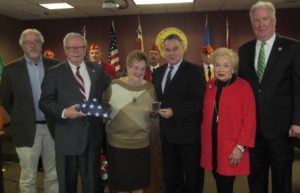 The Medal of Honor earned by a Civil War hero from Monmouth County was returned to the possession of his descendant family on Monday by Congressman Chris Smith, in a ceremony in Freehold Borough.
The Medal of Honor earned by a Civil War hero from Monmouth County was returned to the possession of his descendant family on Monday by Congressman Chris Smith, in a ceremony in Freehold Borough.
Thomas T. Fallon emigrated to the United States from Ireland in 1859, settling in Freehold. He entered the service of the U.S. Army at Freehold during the Civil War and became a private in Company K of 37th New York Infantry, the 4th U.S. Artillery Regiment and served as a sergeant in the 35th New Jersey Infantry until July 1985, three months after the conclusion of the war.
Read the rest of this entry »
Posted: February 4th, 2019 | Author: Art Gallagher | Filed under: Chris Smith, Monmouth County, Monmouth County News | Tags: Civil War, Congressman Chris Smith, Freeholder Lillian Burry, Glenn Cashion, Monmouth County Historical Commission, Monmouth County News, Thomas T. Fallon | Comments Off on Civil War Hero’s Medal Returned To His Family
By Stuart J. Moskovitz
 Statues are coming down everywhere because they represent people who fought for the confederacy, owned slaves or some other historical abomination. Names of buildings on campus are being changed, and one university, Stockton, has removed the bust of its namesake, Richard Stockton and is considering changing the name of the school because this signer of the Declaration of Independence owned slaves.
Statues are coming down everywhere because they represent people who fought for the confederacy, owned slaves or some other historical abomination. Names of buildings on campus are being changed, and one university, Stockton, has removed the bust of its namesake, Richard Stockton and is considering changing the name of the school because this signer of the Declaration of Independence owned slaves.
Since we are going down this road, we need to be consistent and I propose the following changes:
1. Gettysburg needs to be renamed. After all, James Gettys, the founder owned a slave. Henceforth, the Gettysburg Address should be known as the Adams County address, since John Adams didn’t own slaves. Read the rest of this entry »
Posted: August 25th, 2017 | Author: Art Gallagher | Filed under: Opinion | Tags: Civil War, Opinion, Rewriting history, Slavery, Stuart J. Moskovitz | 7 Comments »
 By Evans C. Anyanwu
By Evans C. Anyanwu
If abolitionist Frederick Douglas appeared today in New Jersey and asked for political support from the African American community, he might be surprised at the fact that his political affiliation would far eclipse his accomplishments. Douglas was a Republican.
In April of 1865, shortly after the Civil War ended, and President Abraham Lincoln was assassinated, Douglas gave a speech at the Annual Meeting of the Massachusetts Anti-Slavery Society in Boston. At issue was the voting rights of Black men and to this subject Douglas remarked:
“I have had but one idea for the last three years to present to the American people, and the phraseology in which I clothe it is the old abolition phraseology. I am for the immediate, unconditional, and universal enfranchisement of the black man, in every State in the Union. Without this, his liberty is a mockery; without this, you might as well almost retain the old name of slavery for his condition; for in fact, if he is not the slave of the individual master, he is the slave of society, and holds his liberty as a privilege, not as a right. He is at the mercy of the mob, and has no means of protecting himself.”
Drawing loud applauses from the previous line, Douglas went right into the heart of his speech. He deviated from the conventional thought of most abolitionists, which at the time was that the right to vote should come last. The immediate need for African Americans, most thought, was to end slavery, organize and let voting naturally come at the end of the abolitionist movement. Douglas remarked: “It may be objected, however, that this pressing of the Negro’s right to suffrage is premature. Let us have slavery abolished, it may be said, let us have labor organized, and then, in the natural course of events, the right of suffrage will be extended to the Negro. I do not agree with this.”
Five years after his speech, the ratification of the Fifteenth Amendment to the United States Constitution prohibited the States and Federal government from denying African Americans the right to vote. Thereafter, Thomas Mundy Peterson, a Republican, on March 31, 1870 cast the first vote ever by a Black man, under the just-enacted Amendment, during the Perth Amboy, New Jersey, School Board Elections.
The right to vote, not only for African Americans, but for women, was very important to Douglas. So it is with this background that I write about a very important vote to ensue. There is likely to be a committee vote this month to advance the nomination of Bruce A. Harris, Esq. to the Supreme Court of the same State where Thomas Mundy Peterson cast his historic vote.
Read the rest of this entry »
Posted: May 10th, 2012 | Author: admin | Filed under: NJ Courts, NJ Judiciary, NJ Supreme Court | Tags: abolitionistiss, Abraham Lincoln, African American community, African Americans, Bruce A. Harris, Bruce Harris, Chatham, Civil War, Clarence Thomas, Democrat, Esq., Evans C. Anyanwu, Fifteenth Amendment, Frederick Douglas, Massachusettss Anti-Slaverery Society, Negro, Perth Amboy, Republican, Sandra Day O'Connor, Supreme Court Justice, Thomas Munday Peterson, Yale Law School | 9 Comments »
 The Medal of Honor earned by a Civil War hero from Monmouth County was returned to the possession of his descendant family on Monday by Congressman Chris Smith, in a ceremony in Freehold Borough.
The Medal of Honor earned by a Civil War hero from Monmouth County was returned to the possession of his descendant family on Monday by Congressman Chris Smith, in a ceremony in Freehold Borough.

 By Evans C. Anyanwu
By Evans C. Anyanwu